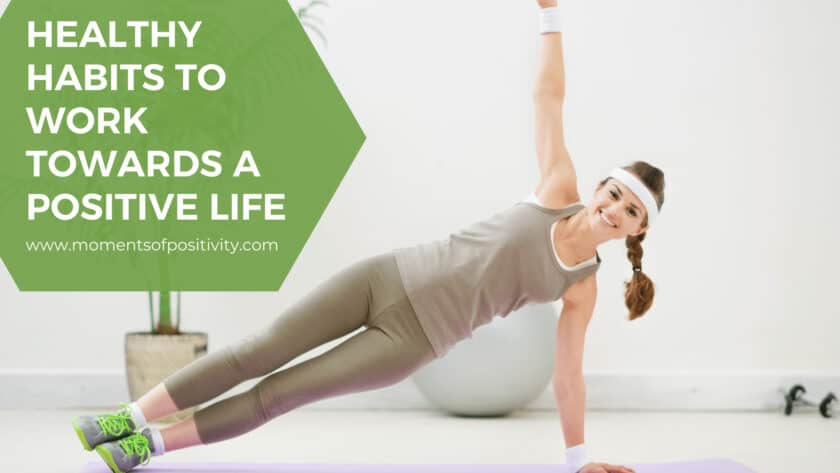Share this
A positive mindset and self-discipline go hand in hand—even if at first glance they have little to do with each other. A person with a positive attitude toward life exhibits traits conducive to self-control and success, while a negative person, through negative thoughts, decreases their chances of success. People who are more optimistic tend to be happier, more restrained when it comes to everyday temptations, and better cope with difficulties.
In a way, optimism is self-control: after all, you have to control what kind of thoughts you allow inside your head and exert willpower to resist the negative ones.
Okay, you’re sold on the idea that optimism is key to self-control. What to do now? How do you become more positive? The answer: you do it through developing and cultivating positive, healthy habits.
Below are the 15 most essential habits to positively influence your life.
Start your day Peacefully
Wake up early to start your day peacefully with no need to rush and with enough time to enjoy a cup of tea, coffee, or a different health drink of choice. Make sure you start on a positive note. The way you start your day is the way your entire day will unfold. If you aren’t an early riser, wake up with enough time to start your day slowly: a margin of 15 to 30 minutes is sufficient to avoid stress and rush.
Self-reflect
Self-reflect on a daily basis. You can write in a journal or spend a few minutes thinking about your life, your goals, actions that you’re taking or not taking, and how it all affect your future. If you rarely spend time thinking about how you want to steer your life, somebody else will steer it for you—and losing control over your life isn’t a particularly good strategy to attain more happiness in life.
Move your body
Exercise regularly, at least 3-4 times a week. Exercise produces feel-good hormones—endorphins—and provides other numerous benefits that will make you feel energized and positive. Don’t participate in boring fitness classes, though. Find a sport that you actually enjoy and look forward to. Otherwise, you’ll never develop a permanent habit of regular exercise.
Challenge Yourself
Exercise can be one way to push your limits. You can also face your fears and voluntarily put yourself in uncomfortable situations (take a cold shower, go camping in the wilderness, hitchhike). Hardships will make you stronger and more appreciative of simple things (for example, after a long bike ride, you’ll definitely enjoy a simple meal much more).
Spend time in nature
Most humans live in urban environments now, but that doesn’t mean we no longer need to feel connected with nature. In fact, now it’s more important than ever to regularly spend time away from the noise, crowds, pollution, etc. Nature is restorative, relaxing, and recharging. As Jill Suttie writes in her article “How Nature Can Make You Kinder, Happier, and More Creative” for the Greater Good Magazine, being in nature decreases stress, makes you happier and less brooding relieves attention fatigue, increases creativity, may help you to be kind and generous and makes you feel more alive.
Read
Reading is a type of meditative experience—if you don’t tune out the world around you, you can’t read (if you don’t believe me, try to read a book while talking with somebody). By focusing your attention on a single activity, you train your ability to focus. You also provide your brain with a respite from modern distractions. You get to learn new things (in the case of non-fiction) or live a different life (when reading fiction). Whether it’s fiction or non-fiction, you also discover new perspectives and grow as a person.
Provide value
Whether it’s answering a question asked on an online forum, helping your friend move, or supporting a local charity, it all makes you feel like you’re a part of something bigger and that your contribution actually matters, and that YOU matter.
Enjoy the Sunlight
Sunlight is essential to every living thing, and humans aren’t different. If you’re spending entire days under artificial light, you’re disrupting natural cycles in your body (circadian rhythms, vitamin D production, and more). An insufficient level of vitamin D will negatively impact your mental health. Not-so-fun fact: Among 104 patients admitted to a psychiatric hospital in the UK, only 8.7% had sufficient vitamin D.
Be silly
A lot of people take themselves way too seriously. It’s difficult to live a positive life if you’re constantly worried about being judged or if you’re offended by even the most innocent jokes. Embrace a relaxed attitude.
Improve your problem-solving skills
Come up with new ideas. Think about how to solve difficult problems. Help a friend deal with their issues. Your ability to solve problems affects how mentally resilient you are.
Be grateful
Appreciate what you have in life and frequently remind yourself that everything can be gone in an instant. Don’t let it worry you, though—learn to enjoy it more precisely because it might be gone at some point.
Learn new things
Self-improvement is one of the keys to happiness. Humans need to grow and feel like they’re progressing in something. There’s no self-fulfillment without self-growth.
Be humble and respectful
Nobody likes to deal with arrogant people. Plus life tends to serve painful lessons to jerks and individuals who consider themselves better than everyone else.
Be patient and determined
Everything worthwhile takes time and effort. A lack of patience makes everything more difficult, particularly when you get angry and frustrated at something you can’t even control. You can achieve everything with determination, and very little with impatience.

Have positive expectations
Your life reflects your expectations. If you set limits, you limit your accomplishments. If you expect not to reach your goals, you probably won’t reach them. If you expect you’ll be a successful person (and work on it), so you’ll be.
Each of these provides a step towards more positivity and joy in your life. Start out choosing one item from the list that resonates with you most. Then move forward and build your own repertoire of positive habits as you go.




A nice reminder, I like the phrase – optimism is self control , shifts the perspective into an entirely new and powerful dimension. I do follow a couple of these -the journal bit, I keep telling myself that I should be going out on walks more, but somehow end up finding a reason about work or weather or something else 😀 ..